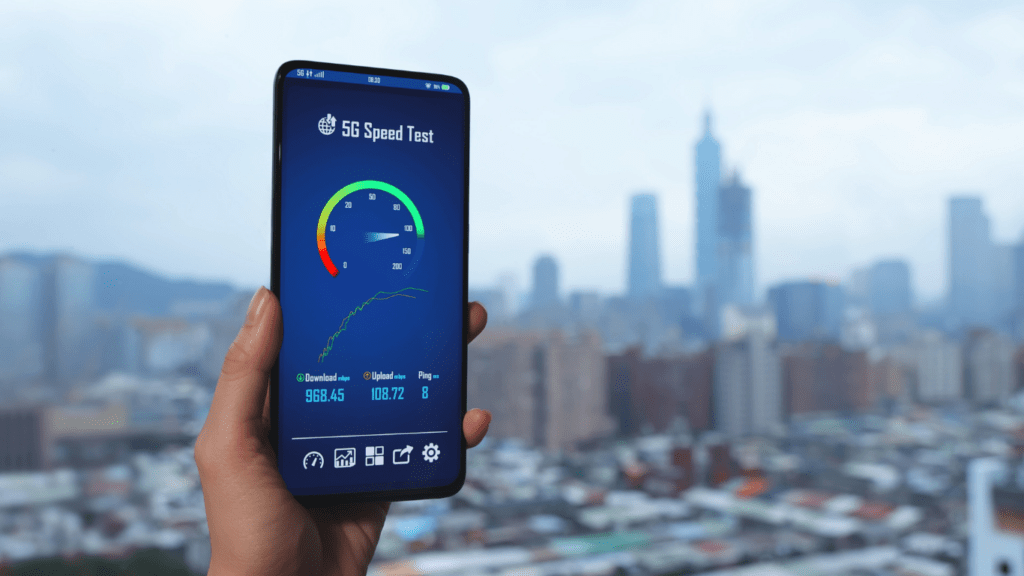What Is 5G and How It Transforms Connectivity
5G is the fifth generation of wireless network technology, offering unprecedented speed, low latency, and enhanced capacity. It delivers data transfer rates of up to 10 Gbps, significantly faster than 4G’s 100 Mbps. With latency as low as 1 millisecond, 5G ensures near-instantaneous communication, further improving real-time interactions.
This technology revolutionizes connectivity by supporting more device connections simultaneously without compromising performance. High bandwidth and reliability enable seamless streaming, stable network connections, and responsive user experiences. These features are critical for dynamic activities like online gambling and gaming.
Edge computing support enhances 5G’s capabilities by reducing data processing time at distant servers. This boosts application performance, especially for multiplayer gaming and live gambling platforms. Combined with IoT and AI, 5G enables innovations such as real-time tracking in esports and hyper-personalized features in online casinos.
The Current Landscape of Online Gambling and Gaming
Online gambling and gaming have grown rapidly, fueled by technological advancements and increased accessibility. These industries now generate substantial revenues and attract millions of users worldwide.
Trends and Growth Statistics
The online gambling market was valued at $61.5 billion in 2021 and is projected to reach $158.2 billion by 2028, with a compound annual growth rate (CAGR) of 11.7%. The global gaming industry surpassed $184 billion in revenue in 2022, driven by mobile gaming, which comprised 50% of the total. Esports betting and live dealer casino games are now among the fastest-growing segments, appealing to younger demographics.
Player engagement trends show a preference for real-time gameplay and interactive experiences. Multiplayer games, virtual casinos, and skill-based gambling platforms dominate market demand, while blockchain and cryptocurrency-based gaming gain traction due to enhanced security and transparency.
Key Technologies Driving the Industry
- Cloud gaming enables users to access high-quality games without hardware limitations.
- Games are streamed from remote servers, reducing barriers to entry for new players.
- Edge computing complements this by minimizing latency, crucial for seamless gameplay and live gambling experiences.
- Augmented reality (AR) and virtual reality (VR) enhance user immersion, allowing players to experience 3D environments in games and casinos.
- Artificial intelligence elevates personalization, improving player recommendations and fraud detection.
- Blockchain technology ensures secure transactions and introduces decentralized platforms, revolutionizing online gambling and gaming mechanisms.
How 5G Impacts Online Gambling

5G enhances the online gambling experience by delivering faster speeds and near-zero latency. These advancements transform gameplay, enabling unprecedented levels of interactivity, security, and real-time engagement.
Enhanced User Experience
5G’s high-speed capabilities drastically reduce buffering and loading times. Players access live dealer games, such as roulette or blackjack, without interruptions. High-definition video streaming and immersive features, like AR and VR, create more engaging virtual casino environments. Multi-device gaming becomes seamless, ensuring consistency whether playing on smartphones, tablets, or PCs.
Increased Real-Time Opportunities
5G’s ultra-low latency supports live betting during sports events and real-time multiplayer casino gaming. Nearly instantaneous data transfer enables gamblers to place bets or react to gameplay outcomes as they occur. For esports betting, players can track live events with minimal delay, elevating both the excitement and accuracy of their participation.
Improved Security Measures
5G improves encryption standards due to its integration with advanced network architectures. Online casinos implement AI-powered security tools for fraud detection and activity monitoring in real time. Enhanced connectivity enables faster authentication of transactions, making online gambling platforms more secure and resilient against cyber threats like account breaches and unauthorized withdrawals.
How 5G Impacts Online Gaming
5G technology is reshaping online gaming with:
- faster speeds
- reduced latency
- improved connectivity
These advancements are transforming gameplay, enhancing access, and paving the way for innovative gaming experiences.
Reduced Latency and Smoother Gameplay
Latency in online gaming determines how quickly data processes between devices and servers. With 5G, latency can drop to as low as 1 millisecond, far surpassing the 4G benchmark of 50 milliseconds. This drastic reduction ensures instant responses to player actions, creating fluid and immersive gaming environments. For fast-paced genres like first-person shooters and battle royales, this means avoiding lag-related delays, which often disrupt gameplay or affect competitive outcomes.
Advancements in Cloud Gaming
5G’s data transfer speeds, reaching up to 10 Gbps, are revolutionizing cloud gaming. This technology allows users to stream graphically demanding games without requiring high-end hardware. Platforms such as Google Stadia and Xbox Cloud Gaming rely on low latency and robust connections for optimal performance. With 5G networks, players experience high-resolution visuals and seamless streaming sessions regardless of device specifications. This opens gaming to broader audiences while eliminating performance bottlenecks tied to local hardware limitations.
Broader Access to Multiplayer Platforms
5G’s enhanced network capacity lets more devices connect simultaneously without performance loss. This feature unlocks massive opportunities for multiplayer games, especially in formats like MMORPGs or online co-op modes. For example, users joining large-scale battles in massively multiplayer games experience stable gameplay even within heavily populated game servers. Additionally, ultra-reliable connections enable cross-platform play, supporting collaboration between players on consoles, PCs, and mobile devices in real-time.


 Gamble Today Smart, founded by Michelles Choigillz, is a forward-thinking platform promoting informed and ethical gambling. It offers data-driven insights, explores the science of luck, and highlights tech trends like AI and blockchain to help users gamble responsibly. Located at 1759 Elk Rd Little, Tucson, AZ 85701, and reachable at +1 520-256-0810, it’s a trusted resource for smarter, strategic gambling.
Gamble Today Smart, founded by Michelles Choigillz, is a forward-thinking platform promoting informed and ethical gambling. It offers data-driven insights, explores the science of luck, and highlights tech trends like AI and blockchain to help users gamble responsibly. Located at 1759 Elk Rd Little, Tucson, AZ 85701, and reachable at +1 520-256-0810, it’s a trusted resource for smarter, strategic gambling.